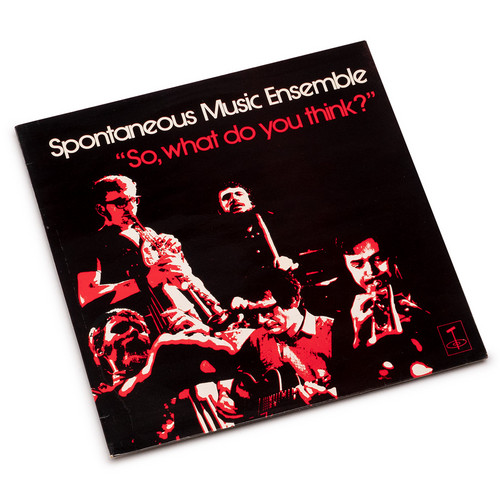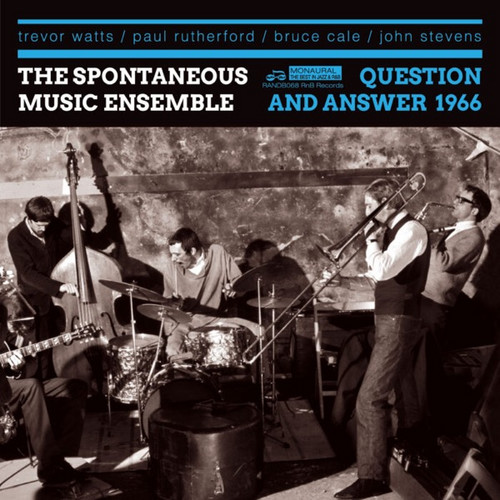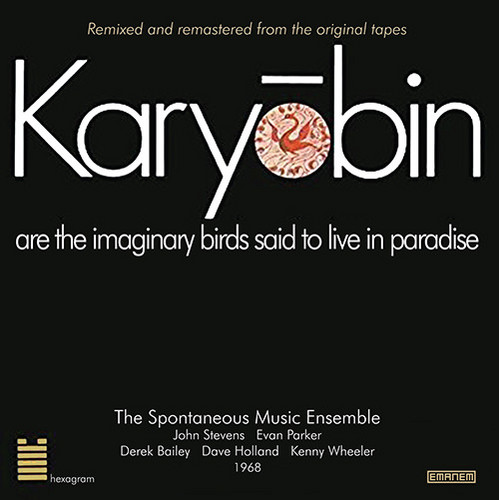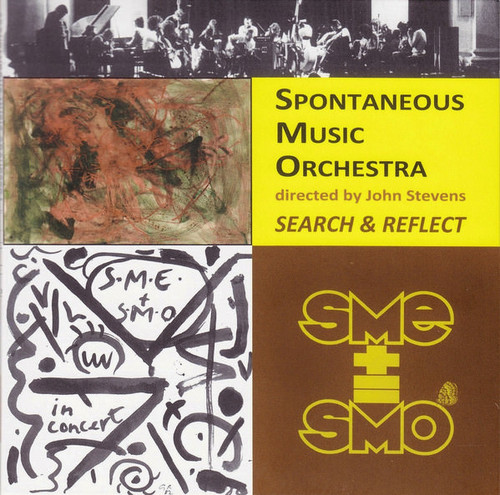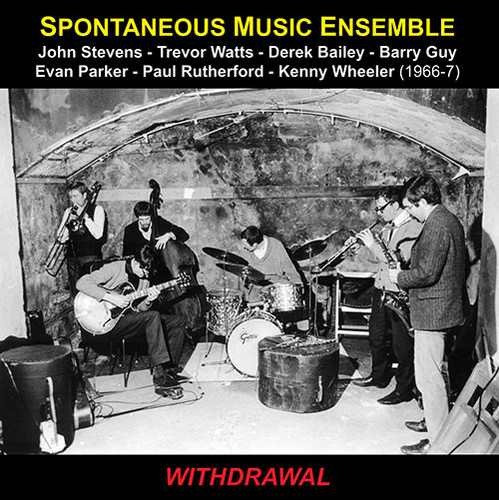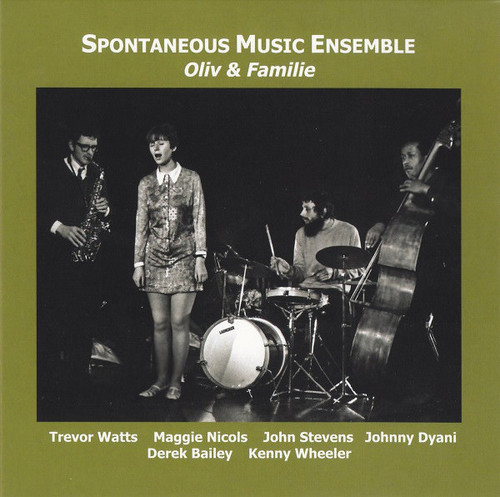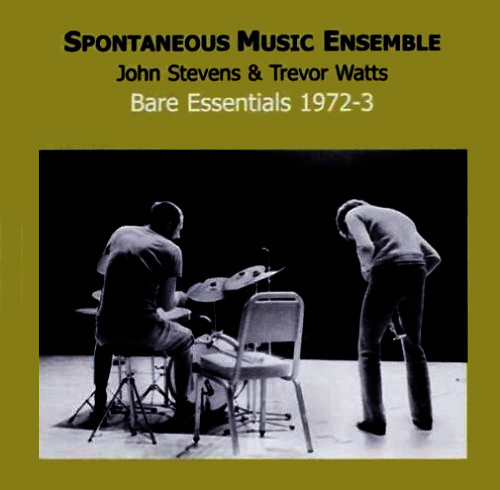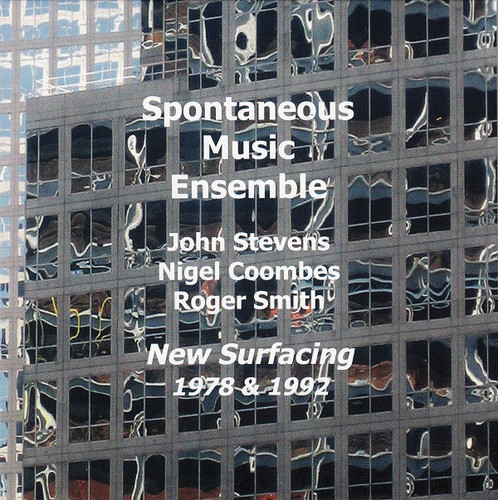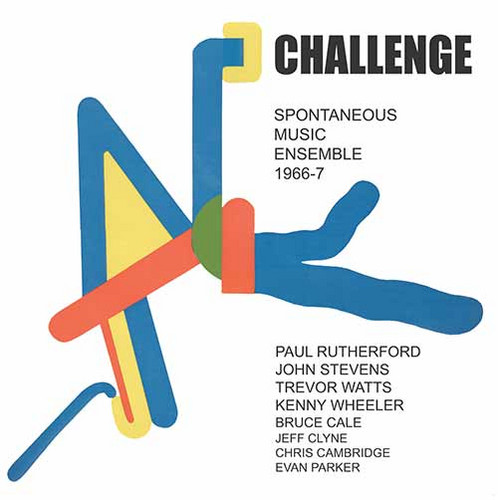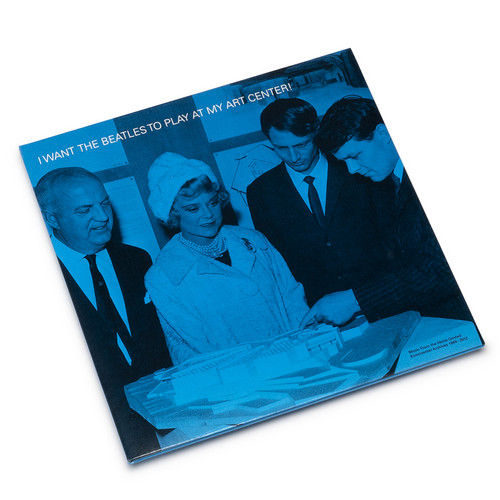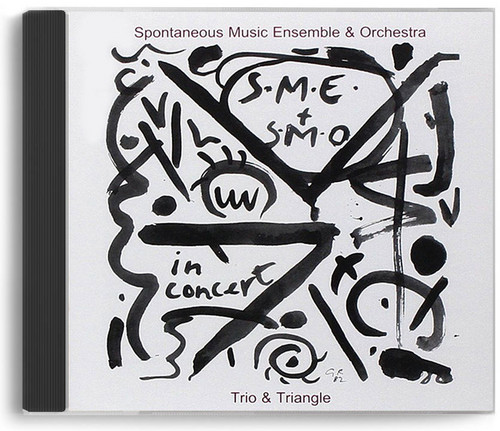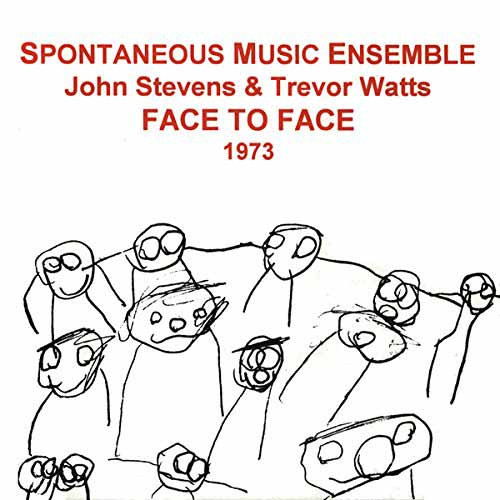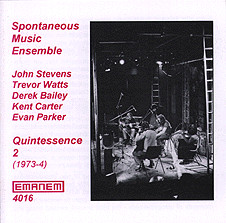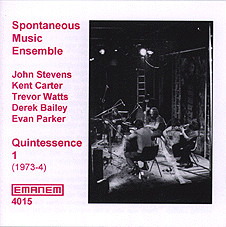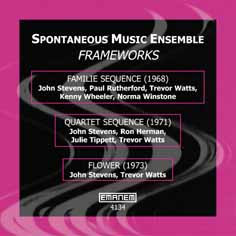Spontaneous Music Ensemble
The Spontaneous Music Ensemble (SME) was a loose collection of free improvising musicians convened beginning in the mid-1960s by the late South London-based jazz drummer/trumpeter John Stevens and alto and soprano saxophonist Trevor Watts. SME performances and recordings could range from Stevens-Watts duos to gatherings of more than a dozen players.
The Spontaneous Music Ensemble (SME) was a loose collection of free improvising musicians convened beginning in the mid-1960s by the late South London-based jazz drummer/trumpeter John Stevens and alto and soprano saxophonist Trevor Watts. SME performances and recordings could range from Stevens-Watts duos to gatherings of more than a dozen players.
So, What Do You Think? (LP)
Original and only edition on Tangent of the 1973 album by John Stevens' and Trevor Watts' Ensemble featuring Derek Bailey, Dave Holland and Kenny Wheeler. With rare insert limited to copies exported to France. A classic never re-issued on either CD or LP.
Question & Answer 1966
If there was one sound guaranteed to shock in British jazz during 1966 it was that of the Spontaneous Music Ensemble, the free-improvising collective centred around drummer John Stevens which that year helped establish London’s Little Theatre Club as a stronghold of the ‘new wave’. Although the avant-garde were slow in gaining a toe-hold on British jazz tastes, every so often a grass roots jazz club would take a chance on the new style, such as the night in June 1966 when the SME alighted on Gre…
Karyobin
Invaluable CD reissue for Spontaneous Music Ensemble’s groundbreaking and inspirational Karyōbin (1968) - a pivotal moment in the history of free-jazz/improvised music featuring the combined talents of Derek Bailey, Evan Parker, Dave Holland, John Stevens and others, now presented by Martin Davidson’s lagendary Emanem label on its golden jubilee, remixed and remastered from the original tapes with new liner notes.The histories of free-jazz, with subsequent narratives of improvisation which grew…
Search & Reflect (1973-81)
Contemporaneous examples of some of the pieces described in the classic manual, Search & Reflect by John Stevens. Outrageous sounds produced by a workshop orchestra directed by him in 1973 - an SME-type improvisation; instrumental & vocal drones; a mechanically rhythmic yet unpredictable piece; and an all-out improvisation featuring non-vocal mouth sounds, vocal sounds & instruments. This is followed by what is perhaps the pinnacle of Stevens' attempts to make music with a large (21 strong)…
Withdrawal (1966/67)
Featuring the earliest published recordings of Barry Guy & Evan Parker, percussionist John Steven's presents transitional sextet and septet performances of his groundbreaking free improv group from 1966 & '67 with Trevor Watts, Paul Rutherford, Kenny Wheeler, and Derek Bailey.
"Here is a missing link between the first two Spontaneous Music Ensemble (SME) recordings to be published. The music on CHALLENGE (recorded 1966 March and issued on a long vanished Eyemark LP) is mainly free jazz, w…
Oliv & Familie
The 1969 Oliv session was the third Spontaneous Music Ensemble LP to be issued, following on from Challenge (1966) and Karyobin (1968), currently awaiting reissue. Familie appears to be the earliest recorded example of a large Sme group. This music is very influenced by slow-moving Gagaku (Japanese court music), especially the semi-composed first half. The second half is largely a free improvisation with a brief return to the written material at the end. An alternative take was recorded, presuma…
Bare Essentials 1972-3
A definite set of bare essentials from the Spontaneous Music Ensemble – especially given that at this point, the group was stripped down to just the duo of John Stevens on percussion and cornet, and Trevor Watts on soprano sax! The material was all recorded live, and the double-length set is an amazing illustration of the genius that Stevens brought to the group – a way of working and reworking a very simple concept – such that the freedom of improvisation was also given a structure, yet …
New surfacing
"Two recordings from the beginning and the end of the longest-lived version of the SME - the trio of John Stevens (percussion, cornet or mini-trumpet, voice), Nigel Coombes (violin) & Roger Smith (guitar). The 1978 Newcastle concert was considered by the musicians and others to be the best performance by the trio, while the 1992 studio is also very fine."-EmanemExcerpts from sleeve notes written by Martin Davidson: "This release containing recordings from 1978 and 1992 could be subtitled t…
Challenge
Available again SME reveals their free jazz roots with only hints of what was to come. "Pure pleasure is the way one might react to this glorious recording, which lays the foundation for Spontaneous Music Ensemble's more radical works to come. In part a product of its time, these tracks are much more in the vein of free jazz than the abstract free improvisational style that came to characterize the group. On Challenge, the lineage can easily be traced directly to the innovations of George R…
I Want the Beatles to Play at my Art Center
Music From the Henie Onstad Kunstsenter Archives 1968-2011. This 2LP presents seminal works of music from the nearly 50-year history of Henie Onstad Kunstsenter (HOK). When HOK founder Sonja Henie exclaimed that she wanted The Beatles to play at her art center, in essence she expressed its founding ambition to produce and stage a lively cross-artistic program that captured the contemporary spirit of the day in live form. This release is filled with previously-unreleased material recorded at H…
Trio & Triangle
John Stevens (percussion, cornet, voice), Nigel Coombes (violin), Roger Smith (guitar). The 1981 London concert features two of John Stevens didactic pieces performed by nine or ten Musicians, plus a Trio improvisation. Another (previously unissued) Trio set can also be heard - the excitement of the music overcomes the imperfections of the recording on this half hour from 1978. Reissue of SFA LP 092 with extra Trio material.
"Sometime in 1976 the SME became a trio made up of John Stevens, Nigel …
Face to face (1973)
"John Stevens (percussion, cornet, voice) and Trevor Watts (soprano saxophone) at the legendary Little Theatre Club - as close as one can get to two musicians improvising as one. Non-repetitive music at its most minimal and essential. Reissue of Emanem 303 (a formative influence on John Zorn among others) with extra material from the same sessions."
Quintessence 2 (1973-4)
2nd volume. The unissued duo works by Stevens (cornet, voice, percussion) and Watts (ss) are way out and an invigorating reminder of the outlandish possibilities of free improvisation, especially "DAA-OOM" ("a loose composition inspired by the music of both the central African pygmies and Albert Ayler -- even 23 years later, the rawness of these pieces is somewhat startling." -- Martin Davidson).
Quintessence 1 (1973-4)
'It's remarkable, really, how excellent and fresh the music sounds. This is a full-flight demonstration of the complexities and rewards available to good players in 1974. The key figure in the group is probably John Stevens. He uses a kit of very small drums and cymbals and a few percussive extras, and his playing is consistently sparse and ingenious. It's old hat to talk about percussionists 'colouring' the character of a group, but that is how Stevens works - he doesn't keep time, he doesn't k…
Frameworks
Three different groups in performances utilising frameworks devised by John Stevens sending the music into unexpected areas. From mid-1968 there is the unusual line-up of JOHN STEVENS (percussion), NORMA WINSTONE (voice), KENNY WHEELER (fluegelhorn), PAUL RUTHERFORD (trombone) and TREVOR WATTS (bass clarinet) in a wide-ranging half-hour sequence. Another half-hour sequence features the superb 1971 quartet of STEVENS (percussion & voice), JULIE TIPPETT (voice & guitar), WATTS (soprano sax) and RO…
A new distance
Two of the last performances by the SME which then comprised John Stevens (percussion & pocket trumpet), Roger Smith (guitar) and John Butcher (soprano & tenor saxophones). A new direction for the music that was sadly terminated later that year (1994) by Stevens' untimely death. Added to this reissue are two short pieces from the previous year, when Neil Metcalfe (flute) was also in the group, and some perceptive comments by Stevens. Reissue of Acta CD 8 with extra material. 63 minutes. Reissue …
Biosystem
John Stevens (percussion & cornet), Nigel Coombes (violin), Roger Smith (guitar), Colin Wood (cello). The first recording of the 'string' version of the SME, that lasted (minus Wood) until 1992." "We had a willow tree in the back garden and I used to look at the willow tree and the grass and think, well we could be like this. We could be very close to nature if we learned how to just purely interact..." John Stevens. Reissue plus 35 minutes of extra material from the same session. Originally re…
Low Profile
The 1977 Derby concert performance by the SME quartet with John Stevens (percussion, cornet, voice), Nigel Coombes (violin), Colin Wood (cello) & Roger Smith (guitar) features an extended (!) tribute to Anton Webern. The CD also contains also 1984 and 1988 London concert recordings by the trio without Wood." (Emanem)
Hot & cold heroes
"The longest lasting and most controversial edition of the SME was that featuring John Stevens (percussion, cornet, voice) with two vastly under-rated acoustic musicians: Nigel Coombes (violin) & Roger Smith (guitar). This selection has an extended home performance from 1980, and three concerts from 1991, one of which has Neil Metcalfe (flute) and John Rangecroft (clarinet) added to the trio. 76 minutes - previously unissued." (Emanem)
Summer 1967
All previously unissued recordings, mainly made up of the duo of John Stevens (percussion) and Evan Parker (ss, ts), with Peter Kowald (b) on about a third of it. This marks the earliest to date recordings of Parker and is a tremendous snapshot of some ancient history. "Parker and Stevens seemed to break through to a deeper level of hearing, where a sound was not set against other sounds but rather against the silence around it, so that one gained heightened awareness of its growth and decay, it…
